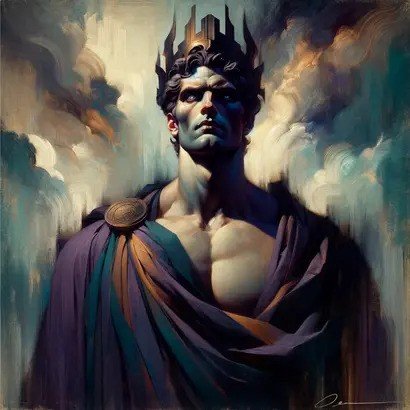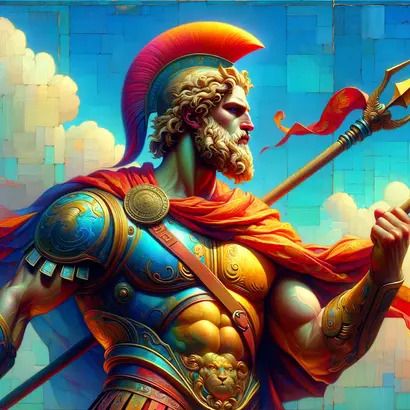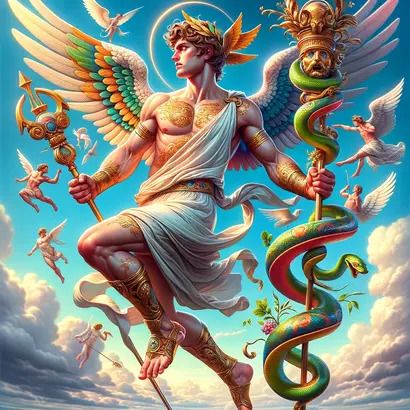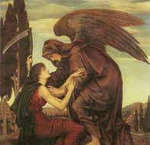
Sisyphus
The Rolling Stones
Sisyphus was the king of Ephyra (Corinth) in Greek mythology. He was the son of King Aeolus of Thessaly and Enarete, not to be confused with Aeolus, the god of the winds. He founded Ephyra, which he ruled over as its first king. His spouse was the nymph Merope, with whom he had four children; Glaucus, Ornytion, Almus, and Thersander. Sisyphus was also closely associated with Autolycus, known for his mastery in theft and trickery, believed to be either his son or brother-in-law.
Violation of Xenia
Although Sisyphus helped its city become a commercial hub and invested in navigation, he was a sly and deceitful person. In numerous occasions, he violated the Xenia, the concept of hospitality and generosity shown to travellers and guests, by killing them, so he could prove that he was a ruthless king. These violations made him fall in the eyes of Zeus, who was in charge of promoting the Xenia. Another time that Sisyphus infuriated Zeus when he told the river god Asopus where his daughter Aegina was - Zeus had previously kidnapped her. In return, Asopus created a spring to flow on the Acropolis of Corinth.
Gods' Revenge
Sisyphus and Thanatos
The now furious father of gods decided to punish Sisyphus for good. He asked Thanatos, personification of death, to take him and chain him in the Underworld. When Thanatos went to Sisyphus, the king asked how the chains actually worked; Thanatos agreed, but Sisyphus swiftly managed to chain Thanatos instead. With Death now in chains, no mortal could die and go to the Underworld. After a while, the situation aggravated, and the god of war Ares, unhappy that his wars were no longer interesting as no one died, released Thanatos. He then trapped Sisyphus and gave him to Thanatos too.
Sisyphus and Hades
Another version of the story has it that Hades was sent instead of Thanatos, and it was him that was tricked and chained by Sisyphus. As a result, people could no longer make sacrifices, and the sick would no longer find peace as they couldn't die. All gods told Sisyphus they would make his life a living hell if he didn't free Hades, and he reluctantly agreed.
Sisyphus and Merope
Before surrendering though and dying, Sisyphus told his wife Merope to later throw his lifeless body in the middle of the city square, as a test for his wife's love for him. As a result, his body ended up on the banks of the river Styx. Sisyphus, now in the Underworld, told Persephone, queen of the underworld, what had happened, and told her to release him and send him back to the living, so he could punish his wife. Persephone agreed, and Sisyphus went back to the realm of the living. He found his wife and scolded her, but he then refused to return to Tartarus. In the end, the god Hermes took him and dragged him there.
Eternal Punishment
The Rolling Stones: Sisyphus' Incessant Struggle
Zeus, fed up with Sisyphus' tricks and cunning as well as his hubris - believing he was more cunning than Zeus - punished him to eternally push a boulder uphill. However, as soon as he would reach the top of the hill, the boulder, like a rolling stone, would roll off and Sisyphus had to push it back again. This daunting task, symbolizing the endless rolling of stones, represents the futile yet persistent endeavors that define the human spirit. This myth later inspired French philosopher Albert Camus, who saw Sisyphus' unyielding labor as a metaphor for the human struggle against the absurdity of life, a cornerstone concept in existentialist philosophy.
See Also: Aeolus, Enarete, Merope, Glaucus, Zeus, Asopus, Thanatos, Ares, Hades, Styx, Persephone, Hermes
Sisyphus Video
Sisyphus Q&A
Link/Cite Sisyphus Page
Written by: The Editors of GreekMythology.com. GreekMythology.com editors write, review and revise subject areas in which they have extensive knowledge based on their working experience or advanced studies.
For MLA style citation use: GreekMythology.com, The Editors of Website. "Sisyphus". GreekMythology.com Website, 30 Nov. 2023, https://www.greekmythology.com/Myths/Mortals/Sisyphus/sisyphus.html. Accessed 27 April 2024.






